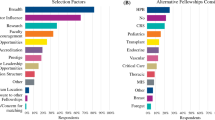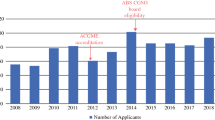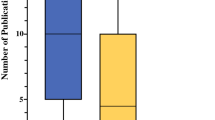Abstract
Background
Despite burgeoning interest in Complex General Surgical Oncology (CGSO) fellowship training, little is reported about postgraduate employment. The goal of this study was to characterize CGSO graduates’ first employment and to identify factors that influenced this decision.
Methods
The National Cancer Institute (NCI) and Society of Surgical Oncology developed and distributed an electronic survey to CGSO fellows who graduated from 2005 to 2016.
Results
The survey response rate was 47% (237/509). Fifty-seven percent of respondents were first employed as faculty surgeons at a university-based/affiliated hospital, with 15% returning to their residency institution. The distribution of respondents’ current employment across the United States mirrored the locations of their hometowns. Eighty-five percent of respondents care for patients across at least three disease types, most commonly hepatopancreatobiliary (81%), esophagus/gastric (75%), and sarcoma (74%). Twenty-seven percent of respondents spend the majority of their time in one area of surgical oncology; melanoma, breast, and head/neck were the most common. Two-thirds of respondents (67%) reported that they performed either clinical or basic science research as part of their current position. Multiple factors influenced the decision of first faculty position.
Conclusions
Most CGSO graduates are employed at academic medical centers across the country in proximity to NCI-designated centers, treat a variety of disease types, and spend a percentage of their time dedicated to clinical research.


Similar content being viewed by others
References
Berman RS, Weigel RJ. Training and certification of the surgical oncologist. Chin Clin Oncol. 2014;3(4):45.
Heslin MJ, Coit DG, Brennan MF. Surgical oncology fellowship: viable pathway to academic surgery? Ann Surg Oncol. 1999;6(6):542–5.
Lee DY, Flaherty DC, Lau BJ, et al. Attitudes and perceptions of surgical oncology fellows on ACGME accreditation and the complex general surgical oncology certification. Ann Surg Oncol. 2015;22(12):3776–84.
National Cancer Institute. NCI Designated Cancer Centers. https://www.cancer.gov/research/nci-role/cancer-centers/find. Accessed 7 July 2018.
Institute of Medicine. Delivering High-Quality Cancer Care: Charting a New Course for a System in Crisis. Washington DC: The National Academies Press, 2013.
Institute of Medicine. Ensuring Quality Cancer Care Through the Oncology Workforce: Sustaining Research and Care in the 21st Century: Workshop Summary. Washington DC: The National Academies Press, 2009.
Tabrizian P, Overbey J, Carrasco-Avino G, Bagiella E, Labow DM, Sarpel U. Escalation of socioeconomic disparities among patients with colorectal cancer receiving advanced surgical treatment. Ann Surg Oncol. 2015;22(5):1746–50.
Mossanen M, Izard J, Wright JL, et al. Identification of underserved areas for urologic cancer care. Cancer 2014;120(10):1565–71.
Wang N, Cao F, Liu F, et al. The effect of socioeconomic status on health-care delay and treatment of esophageal cancer. J Transl Med. 2015;13:241.
Balch CM, Shanafelt TD, Sloan J, Satele DV, Kuerer HM. Burnout and career satisfaction among surgical oncologists compared with other surgical specialties. Ann Surg Oncol. 2011;18(1):16–25.
Kuerer HM, Eberlein TJ, Pollock RE, et al. Career satisfaction, practice patterns, and burnout among surgical oncologists: report on the quality of life of members of the Society of Surgical Oncology. Ann Surg Oncol. 2007;14(11):3043–53.
Society of Surgical Oncology. Surgical Oncology Training Program Requirements. http://www.surgonc.org/training-fellows/fellows-education/surgical-oncology/program-requirements#2.2%20Clinical%20Training%20in%20Surgical%20Oncology. Accessed 7 July 2018.
Rangel SJ, Efron B, Moss RL. Recent trends in National Institutes of Health funding of surgical research. Ann Surg. 2002;236(3):277–87.
Mann M, Tendulkar A, Birger N, Howard C, Ratcliffe MB. National Institutes of Health funding for surgical research. Ann Surg. 2008;247(2):217–21.
Evers BM. The evolving role of the surgeon scientist. J Am Coll Surg. 2014;220(4):387–95.
Wach MM, Ruff S, Ayabe RI, et al. An examination of applicants and factors associated with matriculation to complex general surgical oncology fellowship training programs. Ann Surg Oncol. https://doi.org/10.1245/s10434-018-6674-4 (Online July 27, 2018).
Acknowledgment
This research was supported in part by the Intramural Research Program of the National Institutes of Health, National Cancer Institute.
Author information
Authors and Affiliations
Corresponding author
Ethics declarations
Disclosure
None.
Additional information
Publisher's Note
Springer Nature remains neutral with regard to jurisdictional claims in published maps and institutional affiliations.
Electronic supplementary material
Below is the link to the electronic supplementary material.
Rights and permissions
About this article
Cite this article
Ruff, S., Ilyas, S., Steinberg, S.M. et al. Survey of Surgical Oncology Fellowship Graduates 2005–2016: Insight into Initial Practice. Ann Surg Oncol 26, 1622–1628 (2019). https://doi.org/10.1245/s10434-019-07220-2
Received:
Published:
Issue Date:
DOI: https://doi.org/10.1245/s10434-019-07220-2




